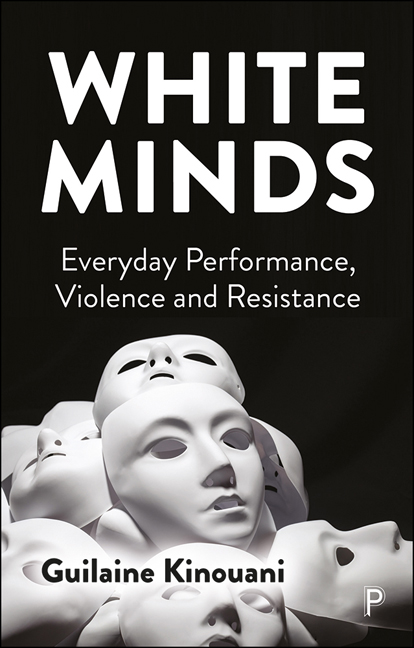Book contents
- Frontmatter
- Dedication
- Contents
- Acknowledgements
- Preface
- Note on language
- Introduction
- 1 Whiteness, time and space
- 2 White gazes
- 3 White envy
- 4 White sadism
- 5 White trauma
- 6 White dissociation
- 7 White shame
- 8 White ambivalence
- 9 White complicity
- Whiteness and resistance: by way of conclusion
- References
- Index
- Frontmatter
- Dedication
- Contents
- Acknowledgements
- Preface
- Note on language
- Introduction
- 1 Whiteness, time and space
- 2 White gazes
- 3 White envy
- 4 White sadism
- 5 White trauma
- 6 White dissociation
- 7 White shame
- 8 White ambivalence
- 9 White complicity
- Whiteness and resistance: by way of conclusion
- References
- Index
Summary
‘There is no such thing as white shame, only white denial. Coloniser confronted with his crime is conflicted and desperate to return to his innocent state. All the bodily responses are of denial, refusal, in worst case fear. Shame? No’ (Alex, white Ukrainian man, 40s, England)
‘White shame is …
To recoil physically and emotionally;
To resist any notion of complicity or bias;
To retort “Who cares that I have suffered too?” ‘ (Beatrice, Anglo Irish white woman, 50s, England)
In 2014, YouGov carried out a study on attitudes to the British empire in Britain [1]. It found that, generally, among the British public, feelings towards the empire tended to be both positive and nostalgic. Three to one, British people surveyed believed the British empire was something to be proud of rather than ashamed of. The same poll sought to discover whether the empire was viewed as a force for good or a force for bad; 43 per cent saw it as a force for good, only 19 per cent saw it as a source for bad. Twenty-five per cent responded that it was ‘neither’. Finally, the research also revealed that a third of participants wished the British empire still existed. The poll came about when then prime minister David Cameron paid a visit to the Punjabi city of Amritsar in India, the site of the 1919 Amritsar Massacre which saw hundreds of Sikh anti-colonialism protesters murdered by troops under British command. Of note, and consistent with the poll, Cameron declined to apologise for this colonial atrocity, instead he proposed: ‘there is an enormous amount to be proud of in what the British Empire did and was responsible for – but, of course, there were bad events as well as good. The bad events we should learn from – and the good events we should celebrate’. He never actually explained what ‘we’ had learnt from the massacre [2].
White narcissism, white shame
It takes a special kind of confidence to address descendants and relatives of the Amritsar Massacre and any other colonial atrocities, look them in the eyes and say, “The British Empire was both good and bad and it is important to celebrate the good.” All the while, survivors and their descendants continue to mourn the dead and remember the violence. This is the kind of confidence which is apparently averse to shame.
- Type
- Chapter
- Information
- White MindsEveryday Performance, Violence and Resistance, pp. 114 - 127Publisher: Bristol University PressPrint publication year: 2023

